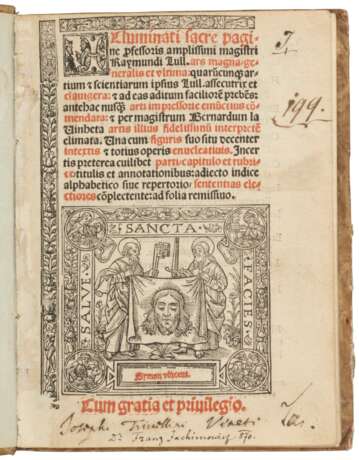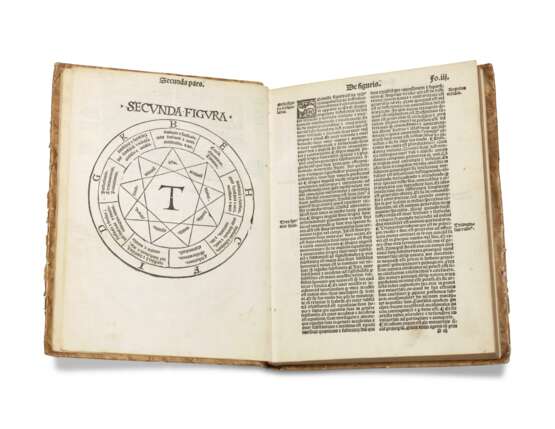ID 519319
Lot 30 | Ramon Lull (1232-1315).
Estimate value
£ 5 000 – 8 000
Ars magna generalis et ultima. Edited by Bernard de Lavinheta (d. c.1530). Lyon: Jacob Marechal for Simon Vincent, 5 May 1517.
Rare third edition, the first edited by the Lullist Bernard de Lavinheta, of Lull’s greatest work, now recognised as perhaps the first work in computer science.
‘Lull invented an “art of finding truth” which inspired Leibniz’s dream of a universal algebra four centuries later. The most distinctive characteristic of [his] Art is clearly its combinatory nature, which led to both the use of complex semi-mechanical techniques that sometimes required figures with separately revolving concentric wheels – ‘volvelles’, in bibliographical parlance – and to the symbolic notation of its alphabet. These features justify its classification among the forerunners of both modern symbolic logic and computer science, with its systematically exhaustive consideration of all possible combinations of the material under examination, reduced to a symbolic coding. The Art’s function as a means of unifying all knowledge into a single system remained viable throughout the Renaissance and well into the seventeenth century’ (DSB). All early editions of this work are rare. ABPC/RBH list, in the last 35 years, no complete copy of the first edition (Venice, 1480), only the Honeyman copy of the second (Barcelona, 1501), and just 3 copies of the third edition since 1980. USTC 144684.
Small quarto (180 x 134mm). Title and last preliminary leaf printed in red and black, title with large woodcut printer's device and border ornament on two sides, woodcut initials and diagrams, including one folding with volvelles intended to be cut out and mounted, smaller printer's device at end (marginal repairs to A2 and C8, tiny wormholes in gutter of a few leaves). 18th-century German marbled boards, spine label lettered in gilt, dated in manuscript to spine (lightly rubbed).
| Address of auction |
CHRISTIE'S 8 King Street, St. James's SW1Y 6QT London United Kingdom | |
|---|---|---|
| Preview |
| |
| Phone | +44 (0)20 7839 9060 | |
| Buyer Premium | see on Website | |
| Conditions of purchase | Conditions of purchase |




